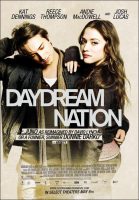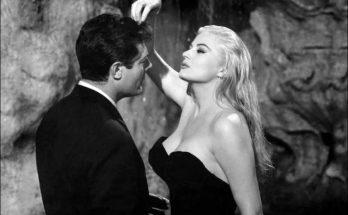
Watching Daydream Nation is an uncomfortable experience, and not because it involves student-teacher sex or the looming threat of a small-town serial killer, or even because it’s kind of dull. No, the most squirm-inducing aspect of this coming-of-age-ish movie is the amount of effort that has gone into making it feel like the smart, off-kilter, affecting alterna-teen romance-fable it so desperately wants to be.
The box trumpets a Variety review name-checking Juno, Donnie Darko, and David Lynch. Throw in Easy A and you’ll have a mini-festival’s worth of vaguely similar movies you should watch instead of this one, which played some actual film festivals and had a brief theatrical run before making its de facto premiere on DVD (part of the festival orphans class of 2010-11 that also includes Passion Play, An Invisible Sign, and Last Night).
Written and directed by Mike Goldbach, Daydream Nation follows Caroline (Kat Dennings) as she begins her senior year at a new school, having moved from an unnamed city to a small town populated by drug-loving hicks. Caustic and moody, Caroline has trouble making friends, and out of boredom sets out to seduce her new teacher Mr. Anderson (Josh Lucas) while using a clumsy flirtation with Thurston (Reece Thompson) as a cover, or a means of making Mr. Anderson jealous, or whatever else comes to mind.

There’s also a serial killer on the loose, murdering local girls; an industrial fire that won’t stop burning; and a student population that, uh, heats up coins with butane lighters and pelts outcasts with them (warning: don’t try this at home — not because it’s dangerous, but because I doubt it’s possible to pull off in the volume depicted here).
Goldbach clearly, some might say desperately, wants to make something distinct and stylized, the kind of movie where you never know what’s going to happen next and you might find yourself laughing in delight at the filmmaker’s unabashed audacity. But Goldbach’s attempts at dreamy surrealism stumble over his writing. Titled digressions, for example, pause the movie to fill in bits of teenage lore that should be vivid and funny, glimpses into the small-town life he wants to evoke. Instead, even the backstories are flat and empty — anecdotes that say little and go nowhere.
A high school dominated by violent burnouts could be a darkly funny idea if Goldbach created a believable world; instead, he can’t stop making characters explain what a weird burnt-out wasteland they populate. “It seemed like craziness was in the air,” Caroline’s voiceover narration insists, contrary to much actual craziness seen onscreen. That narration pops up several times, forcing poor Dennings to read off passages that sound like a wannabe novel.
All of the faux-weirdness and literary pretension glosses over a pretty standard love triangle: Mr. Anderson is the pretty, semi-jerky guy Caroline wants, while Thurston is the nice, weird guy she doesn’t appreciate at first. The rest is just set dressing.
As such, the movie feels like pieces that have been cobbled together, designed to reproduce the sensation of watching an offbeat indie movie. There are some gorgeous shots of nature, the recognizable and capable actors, and an insistent mixtape of a soundtrack — Stars, Emily Haines, and Devendra Banhart, plus a member of Broken Social Scene handling the score, are supposed to signify all sorts of complex emotional reactions to the movie and its mood that you might instead elicit by listening to their albums. Daydream Nation itself is almost spookily devoid of genuine feeling; in place of development, characters are simply given dead parents or friends as needed.
This leaves some good actors stranded in the dreamy, surrealistic alterna-wilderness. Dennings has vulnerability that peeks through her sly joker smile, and her scenes with Lucas carry a mild charge as the characters waver between exploiting each other and beginning an actual relationship. But this negotiation requires a tricky tone not mastered here; what should be deadpan but heartfelt instead comes off stilted. A variety of age groups — parents, 30-somethings, teenagers, tweens — are united by a filmmaker’s inability to write convincing dialogue.
The DVD’s only special feature is a standard, brief making-of notable primarily for Goldbach and the cast attempts to explain how and why the movie works in the face of what should be ample evidence to the contrary. When she decides to seduce her teacher, Dennings notes, Caroline is “playing the precocious young girl,” implying that the character’s and movie’s self-awareness is redemptive or even interesting. Goldbach, for this part, relates the story of a friend returning to his hometown to teach at his old high school, the inspiration for this screenplay.
Maybe he let his imagination run too wild with a perfectly reasonable premise. Goldbach also wrote the odd Canadian comedy-drama Childstar (2004), another movie that depicted characters more by theory than by observation. Daydream Nation tops Childstar in discomfort because of its repeated, painful stabs at unspoken teenage poetry; there’s just something particularly galling about writing with such a tin ear for youth.
I’d prefer not to dismiss a movie on grounds of authenticity. But a movie character this disaffected ought to have seen it coming.
All about Daydream Nation movie.
Daydream Nation (2011)
Directed by: Michael Goldbach
Starring: Kat Dennings, Reece Thompson, Josh Lucas, Andie MacDowell, Natasha Calis, Rachel Blanchard, Katie Boland, Natasha Calis, Laura Jacobs
Screenplay by: Michael Goldbach
Production Design by: Renee Read
Cinematography by: Jon Joffin
Film Editing by: Jamie Alain
Costume Design by: Ken Shapkin
Music by: Ohad Benchetrit
MPAA Rating: R for drug and alcohol use, sexual content, language and some violent images – all involving teens.
Studio: Anchor Bay Films
Release Date: May 6, 2011
Views: 135




